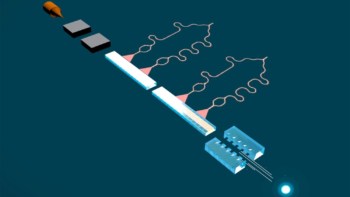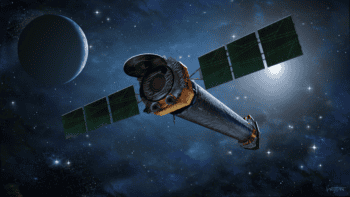Physicists at CERN’s Large Hadron Collider (LHC) are confident that they can find the Higgs boson by the end of 2012, when the machine will be shut down temporarily. This video report for physicsworld.com brings an update from the particle-physics lab near Geneva on the search for the Higgs and new physics beyond the Standard Model.
The most sought after particle in particle physics – the Higgs boson – is believed to endow all other particles with mass. It is also the last undiscovered component of particle physicists’ great theoretical framework – the Standard Model. After decades searching for the Higgs in particle collisions at CERN, and at Fermilab in the US, researchers at the LHC believe they may finally have the elusive particle within their grasp.
“I’m confident that we’ll be able to give an answer, a definite answer; this is without any doubt,” says Guido Tonelli, spokesperson for the CMS experiment. “Clearly this will depend – touch wood – on the good performance of the machine, the accelerator and the good performance of the detector.” Tonelli says that to prove or exclude the existence of the Higgs within the predicted mass region of 115–600 GeV they would probably need all of the data collected from the CMS detector in 2011 and 2012.
Meanwhile, at CERN’s other general purpose detector, the ATLAS experiment, researcher Pippa Wells is equally upbeat. “If it has the very well predicted properties of the theory it can’t escape us over the next couple of years,” she says. Wells reiterates that so long as the accelerator keeps providing the proton–proton collisions then they will have enough data to find a Standard Model Higgs.
In this special video report Wells is also asked whether there is competition between the two collaborations involved in ATLAS and CMS, given the prizes that would surely follow a Higgs discovery. “There’s certainly a friendly rivalry, shall we say, to make sure that we’re in top shape, [that] we’re collecting data efficiently, that we’re looking for all the different possible sorts of new physics,” she says.
Tonelli believes that this internal division will play an important role in searching for the Higgs and making a discovery acceptable to the outside world. “If one of us will be able to provide the first hints of a signal, the other will be able to confirm it or disprove it. The two technologies are completely independent so it is very healthy to have this kind of internal competition.”
Music for the video was provided by the UK group, the Spires.
And the excitement about an imminent Higgs discovery is shared on the other side of the Atlantic Ocean by Harvard University physicist Lisa Randall. In this recent audio interview, Randall talks about the beauty of the Higgs mechanism and the bright future of particle physics. She also shares her disappointment with the decision in the US to close the Tevatron Collider at Fermilab later this year.



